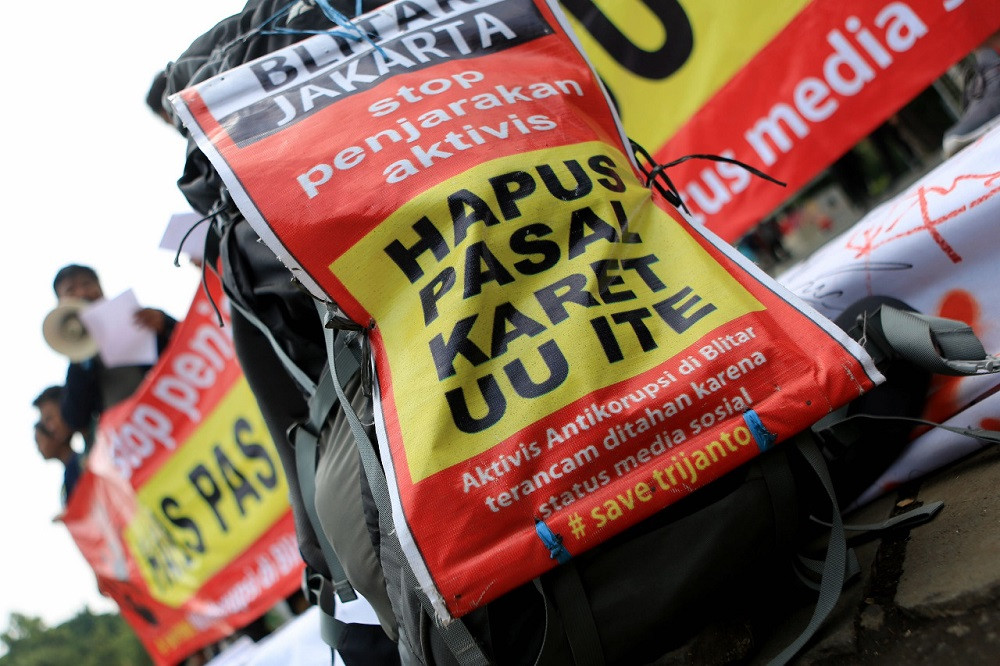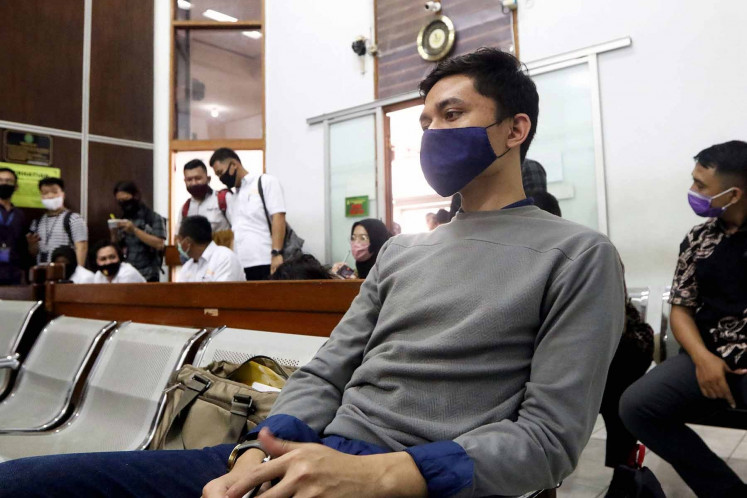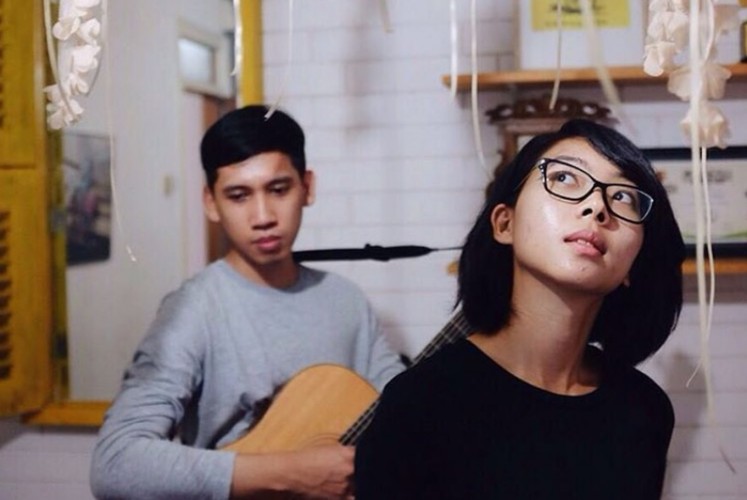Popular Reads
Top Results
Can't find what you're looking for?
View all search resultsPopular Reads
Top Results
Can't find what you're looking for?
View all search resultsOvercoming ‘criminalization’ trauma. Is Indonesia muting critical voices?
Government critics and activists allegedly criminalized by the use of the controversial ITE Law has left them traumatized, with personal and professional setbacks, and often without legal recourse under the current system to clear their names.
Change text size
Gift Premium Articles
to Anyone
It was dawn on Sept. 27, 2019, and singer Ananda Badudu was fast asleep. Suddenly, there was a knock on the door.
“I found myself surrounded by six to seven policemen. They had a warrant for my arrest,” recalled Ananda, now 33. His worst fear had come to pass.
In the days preceding his arrest, a series of demonstrations against a proposed law rocked Indonesian cities, with critics saying that it would curtail civil rights and weaken anticorruption efforts. Using his platform as a former member of popular folk band Banda Neira, Ananda had organized a crowdfunding campaign to support the protesters. He had expected some pushback from authorities, but not this.
“They didn’t tell me what I was being charged with, only that I had to come with them,” he said.
Dragged into a cold interrogation room at the Greater Jakarta Metropolitan Police headquarters (Polda Metro Jaya), Ananda alleged that he was subject to physical and psychological violence, allegations that the police deny. He said he was repeatedly denied the right to legal counsel and was peppered with questions tailored “to fill the police incidence report”.
Then he was suddenly let go, after more than six hours of uncertainty. Still drowsy from lack of sleep, the shell-shocked Ananda emerged outside the station to be faced with a mob of journalists and the discovery that his arrest had caused a minor sensation. As the cameras rolled, he revealed that scores of student protesters were still being detained inside the station and subject to inhumane treatment. Cue pandemonium.
Barely seven months later, a variation occurred on the same theme. On April 22, 2020, researcher Ravio Patra was arrested after allegedly criticizing a government official for conflict of interest.
The details of his controversial arrest read like a crime novel. Ravio awoke that day to find that he could no longer log in to his WhatsApp account and that an unknown third party had attempted to access it remotely. After regaining access to his account, he found scores of angry messages from unknown people.
Independent researcher and government critic Ravio Patra attends a hearing at the South Jakarta District Court on July 14 on the pretrial motion against the Jakarta Police over his arrest. The court rejected the motion. JP/Dhoni Setiawan (JP/Dhoni Setiawan)Trawling through them, he discovered that his number had been used to send a bulk message that called for mass looting and violence. Realizing that something was terribly amiss, he called a colleague to ask for protection. As he waited to be taken to a safe house, policemen intercepted and arrested him.
Like Ananda, Ravio alleges that he was subjected to physical and psychological violence during his detainment, was repeatedly denied access to legal counsel, which the police also deny, and was released suddenly after a public outcry.
And just like Ananda, Ravio has struggled to heal and rebuild his life after his experience.
Trauma and ruin
Ananda lived in constant fear for two weeks after his release. He turned off his phone, moved house constantly and kept in touch only with his closest relatives and trusted colleagues. Returning to his apartment once he felt that the furor had died down, another knock on the door revealed the full extent of his trauma.
“I started shouting, asking who it was and what they wanted.” Ananda recalled. Opening the door, he saw his fiancée staring at him in shock. “I thought I was fine, but I wasn’t. Even now, I still get chills every time I hear [someone] knock on my door.”
Ravio is familiar with this sense of paranoia. Once jovial and sociable, being arrested has turned his life upside-down.
“When something like that happens, you’re not just robbed of your privacy. You lose all sense of security. Every time you step outside of the house, you move in fear,” said Ravio, now 28.
Ten months since his arrest, Ravio no longer has a phone. Only around 15 people, mainly family and close friends, can contact him directly. His laptop is loaded with cumbersome yet vital security programs. He spends every day in anticipation of some unknown existential threat.
“It’s paradoxical. The people we fear will harm us are the very same people we hope will protect us. We lose the sense that we live in a system that can be relied on to ensure our safety and our rights,” he said.
Even when he is making small talk with a taxi driver or a stranger, Ravio refuses to reveal his name.
“People have preconceived notions about my case,” he said. “I don’t know how they would react if they recognized my name. I don’t know if the people I meet on the streets on any given day will be kind to me.”
His arrest was also a major setback to his career. Ravio lost years of professional and personal data, his phone and laptop still in police possession.
“It feels like I had to start from scratch,” he said. “And it’s very burdensome. You feel like you’ve reached a certain point in your life and career, and suddenly everything disappears overnight.”
Small wonder, then, that Ravio has “taken every legal avenue” to hold the police to account for his arrest. However, victims of criminalization are usually left in legal and economic limbo as they profess their innocence in fighting their contentious arrest, and Ravio’s case is still dragging on under the Indonesian justice system.
“I have no closure,” he said, ruefully. “It’s like reading a book and being forced to stop halfway.”
Activist and campaigner Muhammad Arsyad, 37, knows that Ravio faces a long road ahead in restoring his reputation. In 2013, Muhammad was arrested under the controversial Electronic Information and Transactions (ITE) Law for allegedly insulting an official for corruption. He was detained without charge for more than 100 days, and upon his release, he found that his case had turned cold.
“The judge determined I was innocent only in 2018. So for five years, I was unable to get a job. Nobody would hire someone who, technically, was still mired in legal trouble,” he said. To make matters worse, after witnessing an attempt on his life, Muhammad’s parents sold their house in Makassar, South Sulawesi, and moved to the remote provincial regency of Gowa.
Perhaps time can heal all wounds. Once a noted anticorruption activist, Muhammad put himself through law school during his circumstantial hiatus. He emerged a dedicated advocate for freedom of expression and in 2018, he founded PAKU ITE, a community for people who had been criminalized under the ITE Law.
The members of Banda Neira, Ananda Badudu (left) and Rara Sekar (right). The pop duo has officially announced their disbandment via their Instagram account. (instagram.com/bandaneira_official/File)Others, though, have said that their criminalization left them frustrated and cautious. Ananda is one, and says he has become a lot more careful about the words he uses and is wary of publicly supporting civil movements.
“My priority now is my mental health and my own safety,” he said. “I’m a lot more pessimistic these days.”
Silenced ... for now?
Muhammad realizes that such silence and burnout are byproducts of the current system.
“As long as people can still be charged using the ITE law for criticizing the government, they will be afraid to speak up,” he warned. “Cases like Ravio’s and Ananda’s happened in Jakarta, where they got a lot of coverage from the media. But what about those outside Java and the big cities?”
The law’s very existence showed that true democracy did not exist in Indonesia, Muhammad added.
Citing data from the Police Cyber Crimes Directorate, the Southeast Asia Freedom of Expression Network (SAFEnet) noted that investigations of social media accounts for alleged cybercrimes increased each year, from 1,338 cases in 2017 to 2,552 cases in 2018 and to 3,005 cases in 2019. The majority of these investigations were prompted by reports on alleged insults and criticism against politicians, prominent figures and organizations.
Particular scorn appears reserved for human rights activists. The Civil Society Coalition for the Protection of Human Rights Defenders recorded 116 attacks against human rights activists in January to October 2020, with the majority involving alleged criminalization, intimidation and, as in Ravio’s case, hacking of social media and personal messaging accounts.
This sustained, gradual increase in abuse of power means that any public outcry against oppression is muted.
“We’re starting to normalize this culture of oppression,” Ananda said. “Any time there’s a demonstration, we expect the police to respond [with violence]. We expect them to arrest people, hold them without charge and [then] release them after a few days. If an incident similar to Ravio’s and mine happened again, I don’t think people would be as shocked.”
But Muhammad is cautiously optimistic as the government mulls over a possible revision of the ITE Law and stresses the importance of an engaged and critical civil society.
“If that law is repealed, I will prostrate myself in gratitude,” he said.
Ravio, though, remains skeptical. “I’m just going to laugh at that,” he scoffed. “We’ve been down this road before.”












